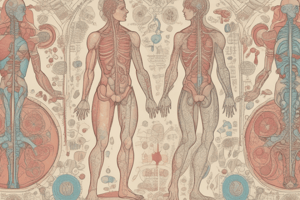Podcast
Questions and Answers
What are hormones?
What are hormones?
Hormones are special chemical messengers created in the endocrine glands that regulate growth, metabolism, and other bodily functions.
Which of the following is a function of hormones? (Select all that apply)
Which of the following is a function of hormones? (Select all that apply)
- Maintenance of internal environment (correct)
- Regulation of blood pressure
- Growth and development (correct)
- Transport of oxygen
What are the two general classes of hormones based on their solubility?
What are the two general classes of hormones based on their solubility?
Hydrophilic hormones and lipophilic hormones.
Hormones are produced in large amounts by various body organs.
Hormones are produced in large amounts by various body organs.
Hormones produced in the ovaries are primarily involved in ______.
Hormones produced in the ovaries are primarily involved in ______.
Match the hormone type with its classification:
Match the hormone type with its classification:
Synergism refers to when different hormones have a lesser effect together than individually.
Synergism refers to when different hormones have a lesser effect together than individually.
What is a trophic hormone?
What is a trophic hormone?
Which hormone is primarily involved in the production and storage of energy?
Which hormone is primarily involved in the production and storage of energy?
Study Notes
Hormones Overview
- Hormones are chemical messengers produced by endocrine glands that regulate bodily functions such as growth and metabolism.
- They exist in small amounts, secreted into the bloodstream, allowing communication between tissues and cells.
Types of Hormones
- Estrogens, Progesterone, Testosterone: Regulate reproductive functions.
- Insulin: Key role in glucose metabolism.
- Cortisol: Involved in stress response and metabolism regulation.
- Growth Hormone: Influences growth and development.
- Adrenaline: Plays a critical role in fight-or-flight response.
- Thyroid Hormones (T3 and T4): Regulate metabolism and energy levels.
General Principles of Hormone Action
- Trophic Hormones: Regulate secretion of other hormones (e.g., FSH, LH, TSH).
- Synergism: Hormones work together for a greater effect (e.g., prolactin with oxytocin).
- Permissive Action: One hormone enhances the effectiveness of another (e.g., thyroid hormones with epinephrine).
- Antagonism: One hormone opposes the action of another (e.g., insulin vs. glucagon).
Functions of Hormones
- Homeostasis Maintenance: Regulate internal environment and adapt to changes. Multiple hormones often work together (e.g., PTH, aldosterone).
- Reproductive Roles: Include puberty, fertility, and sexuality, primarily produced in ovaries and testes.
- Growth and Development: Affected by hormones such as growth hormone, insulin, and thyroid hormones.
- Energy Regulation: Influence glucose and lipid metabolism, significantly impacting brain, liver, and muscle functions.
Hormone Classification
- Divided into Hydrophilic Hormones (water-soluble; e.g., insulin, catecholamines) and Lipophilic Hormones (poorly soluble in water; must bind to plasma proteins; e.g., steroid hormones, thyroid hormone).
Specific Classification Based on
-
Chemical Structure:
- Protein/Peptide Hormones: e.g., insulin, calcitonin, parathyroid hormone.
- Steroid Hormones: e.g., adrenocorticoids, sex hormones.
- Amino Acid Derivatives: e.g., epinephrine, norepinephrine, T3, T4.
-
Mechanism of Action:
- Hormones bind to either intracellular receptors or cell surface receptors, affecting cellular processes directly or indirectly.
Transport of Hormones
- Water-soluble hormones dissolve directly in blood.
- Lipid-soluble hormones require carrier proteins for transport in the bloodstream.
Studying That Suits You
Use AI to generate personalized quizzes and flashcards to suit your learning preferences.
Related Documents
Description
Explore the fascinating world of hormones in this quiz covering definitions, classifications, and functions. Gain a deeper understanding of how hormones act within the endocrine system and their various signals. Perfect for students in the Endocrine System Course at the National University of Sudan.



